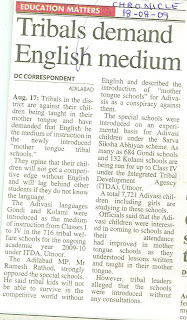[MLE] New UNESCO publication: Improving the Quality of Mother Tongue-based Literacy and Learning
Dear MLE friends, UNESCO Bangkok released last week their latest publication on L1-based education. The book includes case studies from about 19 initiatives in Asia, Africa and Latin America . There is also a study on India written by Dr Barkataki of the State Resource Centre in Assam . The book can be downloaded from the net. See details below.

